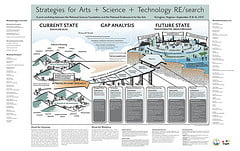
The report follows a September 2010 workshop of fifty-five “artists, engineers, computer scientists, and practitioners who straddle disciplinary boundaries” and “suggests opportunities for advances in the creative innovation economy and education institutions”.
A resolution Harrell, et al., come to—in the face of peer evaluations that tend to put researchers back in a prescribed box—is to incorporate or combine review systems from various disciplines:
[W]e are not always sole determiners of our research and creative practice destinations. Often new enablers are outside peer review groups. In order to communicate with many of these groups, evaluation is key providing the institutional justification for commitment of resources. Hence, we must simultaneously work to expand the intellectual grounding for interdisciplinary forms of evaluation, at the same time as we remain open to engaging in evaluation methods that may be outside the purview of our respective disciplines.
Read the report’s executive summary (PDF): “Strategies for Arts + Science + Technology Research”



